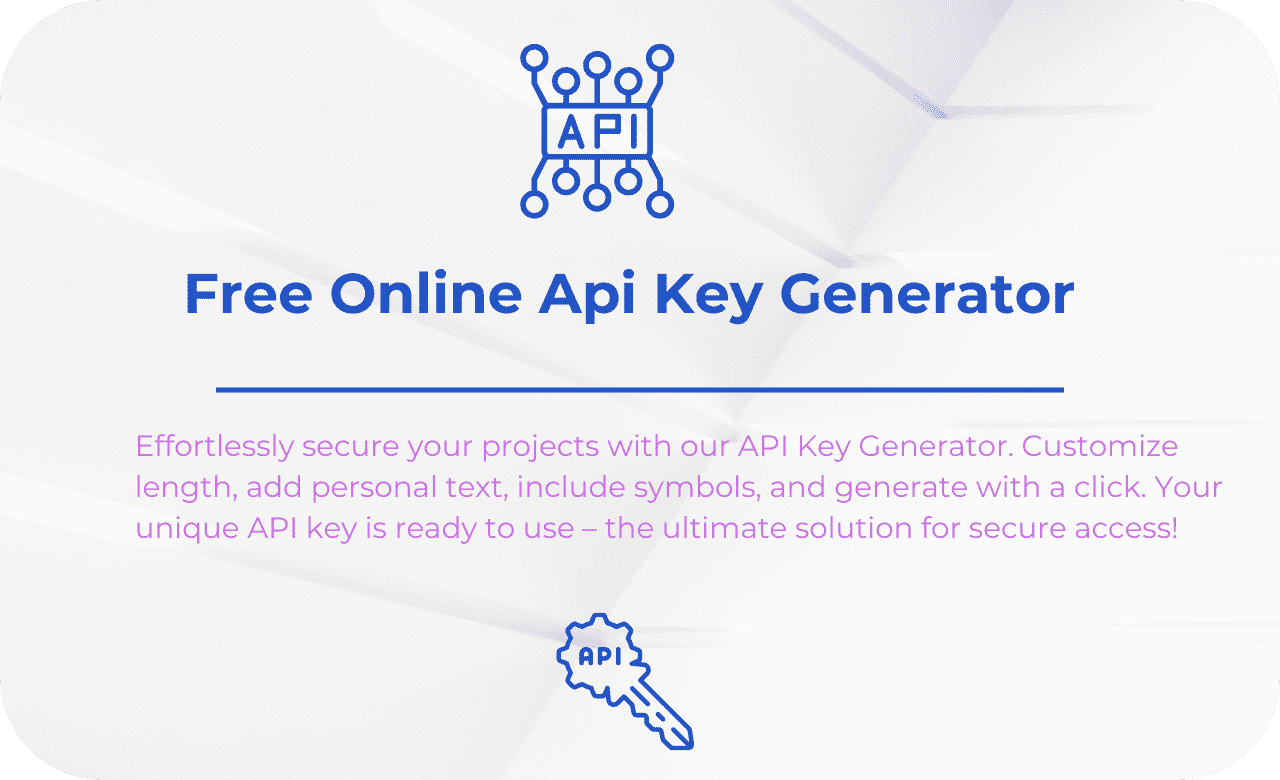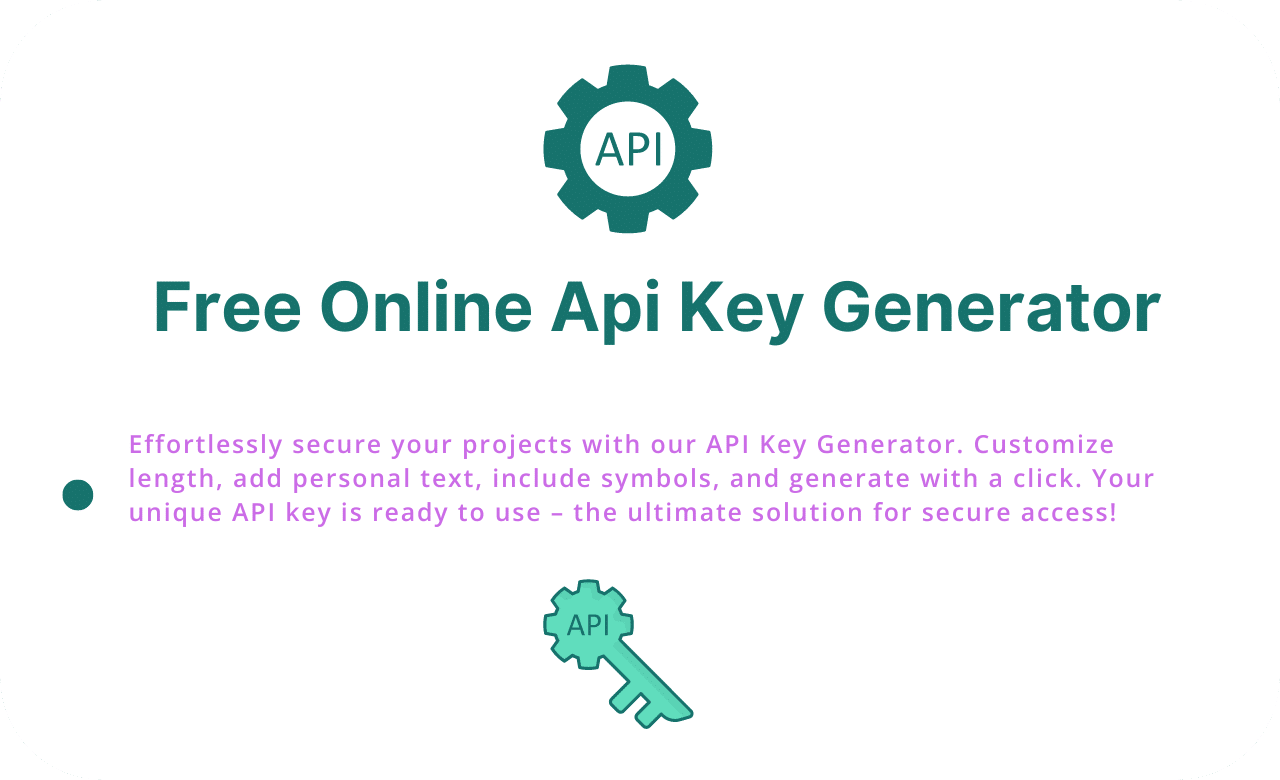Free Online API Key Generator
Introduction:
Knowing how to create an API key is an essential ability for any computer professional, whether they have years of experience or are just starting out. So grab a seat, and join us as we discuss the benefits of using a free online API key generator and the mysteries of API key generation.
What is an API Key?
Let’s get started start with the basics. API keys, also known as Application Programming Interface keys, are akin to private passwords that facilitate communication among diverse software applications. It acts as a distinctive identifier, guaranteeing safe communication between the appropriate apps. To put it another way, it’s the key that opens doors to data and features amongst software programs.
Why Is Generating an API Key Required?
For several reasons, it is imperative to generate an API key. It strengthens the security of your apps by limiting illegal access. Consider a situation where you would like the most recent weather information from a third-party provider to appear on your website. You would require an API key in order to safely access this data. In other words, without it, your application can be turned down cold.
The Free Online API Key Generator
The fun part is about to begin: a free online API key generator. Developers of different skill levels can now generate API keys more easily thanks to this clever tool. A free online API key generator is your go-to tool when developing any software that has to communicate with other services, such as a website, mobile app, or other software.
How to Use Your API Key Generator: A Quick Guide
Step 1: Decide Your Key’s Features
Length:
Choose how long you want your API key to be. Think of it like a password – longer is often better.
Custom Text:
If you have a specific project name or word you want in your key, enter it here.
Include Symbols:
Check this box if you want symbols (like # or @) in your key for added security.
Include Date:
Check this box if you want the current date included in your key. It can be handy for keeping things organized.
Step 2: Generate Your Key
Click on the “Generate” button. This is where the tool does its thing and creates a unique key based on your choices.
Step 3: Copy Your Key
Once generated, your new API key will pop up on the screen. Click on the “Copy” button. Now, your key is copied and ready to be used.
That’s It! You’re done.
Your API key is now readily available for use anywhere you need it, be it in your website, app, or any other location that needs safe access. It resembles having a unique key to open the portals to your virtual reality. Simple, huh? Have fun with coding!
Key Features of Our API Key Generator Tool
1. Customizable Length
Tailor your API keys to your specific security needs by choosing the length that suits your requirements. Longer keys often provide enhanced protection.
2. Personalized Text Inclusion
Add a personal touch to your API keys by incorporating custom text. This feature is perfect for project names or unique identifiers, making your keys easily recognizable.
3. Enhanced Security with Symbols
Strengthen the security of your API keys by including symbols like #, @, !, and more. This additional layer of complexity fortifies your keys against unauthorized access.
4. Date Inclusion for Tracking
Keep track of key generation by including the current date in your API keys. This feature is particularly useful for managing and monitoring key usage over time.
5. Effortless Key Generation
The “Generate” button automates the process, creating a unique API key based on your selected preferences. It simplifies what could be a complex cryptographic task into a single, user-friendly action.
6. One-Click Copy Functionality
Copying your generated API key is a breeze with the “Copy” button. Your key is ready to paste with just one click, negating the need for tedious copying and pasting.
7. User-Friendly Interface
Because of its simple and intuitive layout, our tool may be used by anyone with different degrees of technical competence. Nothing complicated to learn; it’s a straightforward, effective experience.
8. Versatility for Various Applications
Whether you’re developing a website, mobile app, or any software requiring API integration, our tool caters to diverse development needs. It ensures that your generated keys align with the specific requirements of your projects.
9. Cost-Free Solution
Enjoy the benefits of a free API key generator. Say goodbye to the complexities and costs associated with alternative solutions – our tool provides a simple and cost-effective way to secure your applications.
10. Secure Clipboard Copying
The tool ensures the security of your generated keys by facilitating a safe and secure copying process. Your API key is copied to the clipboard efficiently, ready for seamless integration into your applications.
In summary, our API Key Generator Tool combines simplicity with robust features, offering a secure and customizable solution for generating API keys tailored to your unique needs. Regardless of your level of experience as a developer, our solution gives you the ability to easily improve the security of your apps.
Best Practices for API Key Management
Ensuring the security and integrity of your apps requires effective management of your API keys. Observe the following recommended practices:
1. Treat API Keys Like Secrets
API keys are sensitive information. Treat them like passwords and avoid sharing them openly. Store them securely and consider encrypting them if possible.
2. Use Strong, Unique Keys
Create strong, distinct API keys for every service or application. Extended keys that combine symbols and alphanumeric letters improve security and lower the possibility of unwanted access.
3. Regularly Rotate Keys
Implement a key rotation policy. Regularly update and replace API keys, especially if they are long-lived. This practice mitigates the risk of compromised keys.
4. Limit Access and Permissions
Assign the minimum necessary permissions to each API key. To lessen the possible consequences of a security compromise, adhere to the least privilege principle.
5. Monitor Key Usage
Implement logging and monitoring for API key usage. Review logs on a regular basis to spot any odd or suspicious activity so that possible security issues can be addressed quickly.
6. Set Usage Quotas and Limits
Define usage quotas and limits for each API key to prevent abuse or unexpected spikes in traffic. This helps maintain the stability and performance of your application.
7. Implement API Key Expiry
Set expiration dates for API keys. This guarantees a limited lifespan for compromised keys, hence decreasing the window of opportunity for malicious activity.
8. Use HTTPS for Key Transmission
When transmitting API keys, always use HTTPS to encrypt the communication between clients and servers. This safeguards the keys from interception during transit.
9. Secure Key Storage
Store API keys securely, whether in configuration files, databases, or other storage solutions. Avoid hardcoding keys directly into source code to minimize the risk of exposure.
10. Educate Development Teams
Provide training and guidelines to development teams on secure API key management practices. Raise people’s understanding of the possible dangers of misusing API keys.
11. Use MFA, or multi-factor authentication
For applications that support it, consider including multi-factor authentication (MFA) in addition to API keys. Because more verification processes are needed, this provides an additional degree of protection.
12. Regular Security Audits
To evaluate the overall security of your API key management system, conduct security audits on a regular basis. Determine weak points and fix them quickly to keep a strong security posture.
13. Use API Key Management Tools
Think about using specialized solutions for managing API keys, such as those that provide access controls, audits, and centralized key storage. The process of keeping your API keys safe and secure is made easier with these tools.
Following these best practices will help you build a strong foundation for API key management, enhancing the security and dependability of your apps in the always changing digital world.
Your Questions and Their Answers about API Key Generator (FAQ)
1. Why do I need an API key, and what does it mean?
An Application Programming Interface (API) key is a special code that enables safe communication between various software programs. It ensures that only approved apps may access particular data or features, much like a secret password. In order to improve the security of your applications and provide a controlled and secure exchange of information, you need an API key.
2. How does the free online API key generator work?
Our API key generator simplifies the process of creating secure API keys. Users can customize key features such as length, include custom text, symbols, and even the current date. Depending on the chosen preferences, pressing the “Generate” button initiates an automated key generating process. Users can quickly copy the produced key to their clipboard for easy application integration by clicking the “Copy” button.
3. Are there specific use cases for API key generation?
Absolutely! For a number of situations, such as web development, mobile app development, and any software that has to communicate with other services, API key generation is necessary. For example, creating an API key is essential for safely gaining access to real-time weather updates from a third-party service on your website.
4. How secure are the API keys generated by this tool?
The API keys generated by our tool prioritize security. They can be customized with features like symbols and date inclusion for added complexity and tracking. Additionally, the tool incorporates best practices for secure key management, such as regular rotations, limiting access, and monitoring key usage. These measures collectively contribute to creating robust and secure API keys.
5. Can I use the API keys generated by this tool for different applications?
Yes, the API keys generated by our tool are versatile and can be used across various applications. The tool allows customization to meet the specific requirements of different projects. However, it is advisable to follow best practices and generate unique keys for each application to enhance security and manage permissions effectively.
Conclusion
Whether a developer is seasoned or brand-new to the industry, they must learn how to generate API keys. The exploration of a free online API key generator revealed a user-friendly tool that simplifies the complex process, offering customizable features and robust security. The generator’s cost-effectiveness and adaptability guarantee its smooth integration into a range of projects. When combined with recommended procedures for managing API keys, developers may confidently traverse the digital terrain, guaranteeing safe connections and protecting their apps in the constantly changing world of technology.


